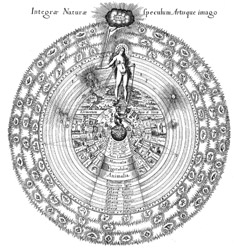hot and cold
My heart boils up, aspiring to your heat;
Closes its eyes to grope what you see clear;
Drinks poison to be worthy to drink you;
Forges itself as a ring to grace your ear.
#835: From Rumi's Kolliyaat-e Shams-e Tabrizi
The opposites of hot and cold demanded attention today and heat gave me this puzzling verse of Rumi's. The probably deliberate vagueness of the "you" referent suggests that a general "other" or "thou" is meant here. Rumi's "I" or self-identity is clearly small in contrast to this "you" and this suggests that the "you" is the higher or more all-encompassing Self. In the first line, there is a great and turbulent passion; in the second, there is a helpless quest for insight. I suspect that the poison of the third line is wine since drinking alcohol does raise one's sense of self-esteem and mystical ecstasy has often been compared to this ordinary intoxication. The symbol in the fourth line is the most intriguing. I'm not sure whether men as well as women wore earrings in Rumi's culture and times.
A Google search revealed that Muslim men are generally advised not to wear earrings. The following scholarly reply has a comic sound to Western ears, to think that such a trivial issue could be taken so seriously.
In the name of Allah, Most Compassionate, Most Merciful,
It is impermissible for men to wear earrings or have their ears pierced in order to wear earrings. There are certain reasons for this prohibition:
Firstly, it is agreed upon by the scholars, that it is unlawful for men to adorn themselves with any type of jewellery besides a silver ring. (See: Ibn Qudama, al-Mughni, 2.324 & al-Mawsu’a al-Fiqhiyya).
The great Hanafi Jurist, Imam al-Haskafi (may Allah have mercy on him) states in his famous work, Durr al-Mukhtar:
"It is not permissible for a man to adorn himself with any type of gold and silver whatsoever (mutlaqan) besides a silver ring..." (Radd al-Muhtar ala al-Durr al-Mukhtar, 6/358-359, fasl fi al-libas).
Secondly, earrings are (still) generally considered a type of adornment for women and even in the West they were originally worn by those men who wanted to imitate women. Imitating women intentionally is considered unlawful in Islam.
Sayyiduna Abd Allah ibn Abbas (Allah be pleased with him) relates, that the Messenger of Allah (Allah bless him & give him peace): "Cursed those men who imitate women and those women who imitate men" (Sahih al-Bukhari, 7/205).
Thirdly, wearing earrings is a custom that developed and is generally prevalent among non-Muslim men, and imitating non-Muslims is also impermissible.
Sayyiduna Abd Allah ibn Umar (Allah be pleased with him) narrates that the Messenger of Allah (Allah bless him & give him peace) said: "Whoever imitates a people is one of them." (Sunan Abu Dawud, no. 4031 & Musnad Ahmad, 2/50)
Given the above reasons, it would not be permissible for men to wear and adorn themselves with earrings.
And Allah knows best
Muhammad ibn Adam al-Kawthari,
Darul Iftaa, Leicester, UK
source: Sunni Path: Q & A
Apart from being a feminine adornment, the ring as circle is also a simple but universal symbol associated with wholeness, the goddess or female power, and the earth.

Anima Mundi
or World Soul of alchemy
or World Soul of alchemy
I am left, then, with the plausible conclusion that the "you" in Rumi's verse is a female being of some grandeur. Surely this is a kind of prayer to or invocation of the Great Goddess Herself. The more I read of Rumi the more convinced I become that he was a secret goddess worshipper. In a patriarchal culture like Islam he would have needed to be quite circumspect in his allegiance. How better to express your love of the goddess than through love poems to a lost male friend?



0 Comments:
Post a Comment
<< Home